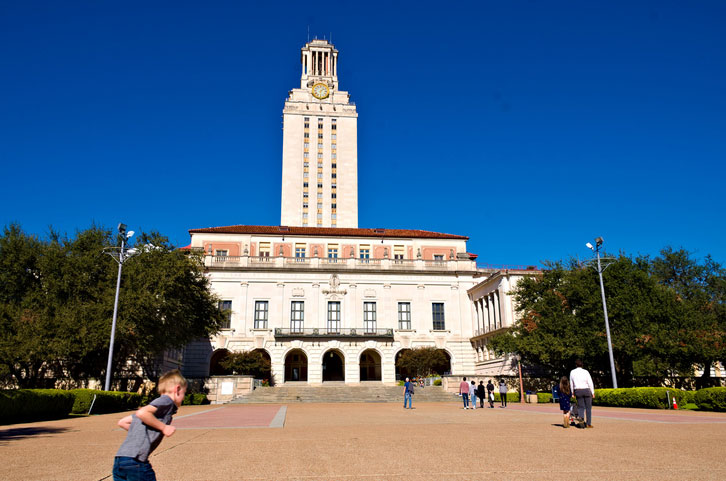Written by Helen Lewis

Austin is the capital city of the Lone Star State. Today, nearly 2.3 million people live in the Austin metropolitan area, making it one of the fastest-growing cities in America.
In this prosperous, young city, the average resident is about 35 years old, and the average household has a median annual income of $89,415. Austin is also ethnically diverse: 49% of Austin residents are people of color, and just under 48% of residents are non-Hispanic Caucasians.
Social Work in the City of Austin, TX
According to the Bureau of Labor Statistics, “Overall employment of social workers is projected to grow 7 percent between 2022 and 2032, faster than the average for all occupations.”


Austin’s rapid population growth over the last several decades has led to strains in social programs, leading to suburban sprawl and infrastructural challenges. Some of the largest social issues currently in Austin, Texas include:
- Housing: In 2021, Texas Governor Gregg Abbott passed a law that prohibited unhoused people from camping in public areas. Though the state simultaneously launched the Heal Initiative, an accessible housing program, some residents say that homelessness in Austin remains a prevalent social issue.
- Disaster Response: In recent years, Austin residents have been sharply critical of the city’s government for its limitations in adequately safeguarding citizens from catastrophes. Some detractors described the municipal response as “less effective and disorganized,” without adequate planning or resources.
- Environmental Issues: In 2023, the Austin city government stated that it planned to invest resources into energy distribution and community resilience strategies, as well as to partner with the University of Texas at Austin to research the local effects of climate change.
Each of these pressing current issues offer a wide array of diverse employment opportunities for professionals with MSWs. Within these contexts, social workers can offer their skills in a myriad of ways, such as: substance abuse counselors, trauma and emergency response therapists, child welfare professionals, advocates, community organizers, grant writers, and family therapists.
Employment as a Social Worker in the Austin Hospital System
Social workers at hospitals in Austin serve a critical role providing comprehensive care to patients and their families. Their responsibilities encompass a wide range of tasks aimed at addressing psychosocial needs, facilitating discharge planning, and ensuring continuity of care. Powered by a set of skills that include sensitivity toward cultural differences, recognizing signs of abuse, and providing emotional counseling, social workers are a key ally to patients in the Texas healthcare system.
Within this field, social workers in Austin can earn over $100,000 a year.
At hospitals like the Austin State Hospital, Dell Seton Medical Center at The University of Texas, and Texas Children’s Hospital, social workers collaborate with interdisciplinary teams to conduct psychosocial assessments, identify patients’ needs, and develop individualized care plans.
They offer emotional support, counseling, and crisis intervention to patients and families facing medical crisis, chronic illnesses, or end-of-life care decisions. Additionally, they serve as liaisons between patients, healthcare providers, and community resources, connecting individuals with necessary services such as home health care, rehabilitation, or financial assistance programs. Social workers can be especially useful to disadvantaged patients, such as those who may not speak English, or who may be undocumented and unsure of how to access medical care.
Hospital social workers in Austin often speak up for people whose voices go unheard, assisting with navigating complex healthcare systems and advocating for patients’ rights. They provide education on healthcare options, advance directives, and available resources, empowering patients and their families to make informed decisions about their care. Social workers also collaborate with community organizations, government agencies, and insurance companies to coordinate post-discharge services and ensure a smooth transition from hospital to home or other care settings. By addressing social determinants of health and promoting holistic well-being, hospital social workers contribute to improved patient outcomes and enhanced quality of life for individuals throughout the Austin area.
Social Impact Startups in Austin: A New Space for Social Work

Austin, Texas has emerged as a hotspot for startups, with a growing number of entrepreneurs dedicated to using their business to address pressing social and environmental challenges. These startups span various industries, from technology to sustainable fashion, and prioritize creating positive change alongside profitability.
One example of a social impact startup in Austin is Bonterra, a company focused on increasing philanthropy in the United States. If you’re interested in learning the skills required for social work but are also hoping to earn more than the average social worker, employment at a socially-conscious for-profit company like Bonterra is one way to put your MSW to use while pursuing higher financial goals. In this capacity, social workers can offer their skills as team members like grant writers, community advocates, and development directors.
Finding an Internship in Social Work in Austin
Fieldwork and internships in social work are often required to attain an MSW degree and licensure, but also in preparing prospective employees for the challenging—but deeply rewarding—labor of social work. Through doing these internships, you’ll be best prepared to jump into the real tasks of social work with confidence.
Social work takes many forms, so it’s only natural that internships would take many forms, too. Some possible internships could include:
- Clinical social work intern at a hospital or medical center
- Case management intern at a nonprofit organization serving the homeless population
- Child welfare intern at the Texas Department of Family and Protective Services
- School social work intern in a local school district
- Mental health counseling intern at a community mental health center
- Substance abuse counseling intern at a rehabilitation facility
- Aging and gerontology intern at a senior living facility or organization
- Domestic violence advocacy intern at a shelter or crisis center
- Refugee resettlement intern at an organization assisting refugees and immigrants
- LGBTQ+ advocacy intern at a community center or organization
- Disability rights advocacy intern at a disability services organization
- Policy research and advocacy intern at a social justice organization
- Youth mentoring intern at a youth-serving nonprofit or organization
- Community organizing intern at a grassroots organization
- Rehabilitation counseling intern at a vocational rehabilitation center
- Mental health outreach intern with a mobile crisis team
- Nonprofit program development and evaluation intern
- Hospital discharge planning intern at a healthcare facility
- Family therapy intern at a counseling center or private practice
- Substance abuse prevention and education intern at a community organization
- Homelessness prevention and housing advocacy intern
- Crisis intervention intern with a crisis hotline or intervention team
- Legal advocacy intern at an organization providing legal services to underserved populations
- Child advocacy intern at a child advocacy center or organization
- Community health education and promotion intern with a public health organization
- School-based prevention and intervention intern focusing on bullying prevention or social-emotional learning
- Restorative justice intern with an organization promoting alternative dispute resolution and conflict resolution skills
- Art therapy intern at a community arts organization or therapeutic program
- Peer support specialist intern at a mental health or substance abuse recovery program
- Early childhood intervention intern at an organization providing services to young children with developmental delays or disabilities.
MSWs: Social Work Degrees in Austin, TX

Texas is home to a number of universities with well-regarded degree programs in social work, like Texas State University, Texas Tech University, Texas Christian University, Baylor University, University of North Texas, University of Texas at Austin, and the University of Houston.
Some of these schools, like the University of Texas at Austin: Steve Hicks School of Social Work, provide both in-person and hybrid learning options. That means that, as a student, you’ll have the opportunity to engage in IRL courses, but also have the option to learn remotely.
University of Texas at Austin vs. Stephen F. Austin: Choosing a Grad School for Social Work
While you research MSW programs in Austin, you’re likely to come across two significant programs: the University of Texas at Austin (UT Austin) and Stephen F. Austin State University (SFA).
UT Austin’s Steve Hicks School of Social Work is a well-established program known for its comprehensive curriculum, esteemed faculty, and diverse field placement opportunities in the vibrant city of Austin. The program benefits from its proximity to numerous community resources and research centers, providing students with hands-on experiences and networking opportunities.
On the other hand, SFA’s Department of Social Work offers a smaller, more intimate learning environment in the East Texas town of Nacogdoches. While SFA may have fewer resources compared to UT Austin, it fosters close-knit relationships between students and faculty, offering personalized attention and support throughout the program.
When choosing the right MSW program for you, it’s important to begin by asking yourself: Which program best aligns with my aspirations?
Are you hoping to find a mentor and a tight-knit community, or are you looking to dive into research? What kind of jobs can you imagine looking for after graduation? Would it be something that requires licensure (i.e., clinical social work? In that case, it would be best to specifically look for accredited programs, as some workplaces do not recognize MSW degrees from non-accredited schools.
The best way to move forward is to do your research. Visiting campuses, attending information sessions, speaking with current students and alumni, and carefully reviewing program curricula are all great ways to make informed decisions about selecting the MSW program that’s right for you.
Social Worker Salaries in Austin
According to the Bureau of Labor Statistics, there is a wide range in salaries for social workers, with employees in this field earning anywhere from $32,730 to $97,280 annually. In some fields, such as healthcare, social workers in Austin can earn over $100,000.
The table below offers a glimpse into the range of salaries—from the bottom 10% of earners to the top 10% of earners—available to social workers in Austin across four categories. The final category, “Social Workers (All Other),” is broad enough that it may include such diverse positions as community organizers, homeless shelter workers, corrections social workers, grant writers, and crisis hotline counselors.
Social Work Specialty | 10% | 25% | 50% (Median) | 75% | 90% |
Child, Family, and School Social Workers | $37,070 | $45,780 | $50,250 | $58,990 | $64,690 |
Healthcare Social Workers | $42,090 | $51,310 | $66,840 | $87,400 | $100,680 |
Mental Health and Substance Abuse Social Workers | $32,900 | $35,700 | $38,120 | $48,280 | $59,010 |
Social Workers (All Other) | $41,650 | $50,260 | $61,050 | $73,870 | $89,250 |
Table data taken from 2022 BLS reports for the Austin-Round Rock metropolitan area.
2022 US Bureau of Labor Statistics job market trends and salary figures for child, family, and school social workers, healthcare social workers, mental health and substance abuse social workers, and social workers (all other) are based on national data, not school-specific information. Conditions in your area may vary. Data accessed March 2024.





